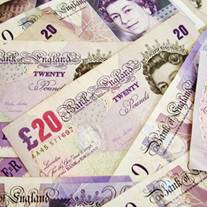Aug 2011: We're currently updating this guide to include the 2011/12 interest rates changes (Old Style 'Mortgage' Loans: 5.3%, New Style 'Income' Loans: staying at 1.5%). For more see the News story.

The halcyon year of interest free and even shrinking Student Loans Company rates has ended. For the 2010/11 academic year the rate is now 1.5% or 4.4%, depending on when you took it out. So the question is "should I pay off my student loan?"
This guide takes you through the latest changes, how you're affected, and answers all the key questions including including the unique Student Loan Calculator, which tells you how long it'll take you to repay.
In this guide
My, times have changed
This guide only covers official Student Loans Company (SLC) loans not Personal, Career Development or professional studies loans (also see the Pay Off Debts With Savings? guide).
 What's the cost?
What's the cost?
A whole generation of Brits now have student loans; anyone who started higher education since 1990 has been eligible, so even those who left 17 years ago could still have them. And with the massification of higher education, that means nearly four million people in total. Yet many of these have had little if any education on these matters. See the full Financial Education Campaign section for lots more info.
The exact interest rate you pay depends on when you started university.
| Old Style 'Mortgage' Type Loans | New Style 'Income' Type Loans |
|---|---|
Who's got them? Anyone who started higher education between 1990 and 1997. |
Who's got them? Current students and anyone who started during or after 1998. |
| Current Interest rate? 4.4%. So a £10,000 balance on 1 September will reach £10,440 after a year, ignoring any repayments. For more info see the Interest Rates guide. |
Current Interest rate? 1.5%, provided the Bank of England Base Rate remains at 0.5%. If there's movement it'll track this plus 1% point, up to a maximum rate of 4.4% in total. So in a year a £10,000 balance will accrue £150 worth of interest, if it stays at 1.5%. See the Interest Rates guide. |
Last year's interest rate? -0.4%. So loans actually SHRUNK. For example, a debt of £10,000 on 1 September 2009 would have dropped to £9,960 by 31 August 2010 (ignoring any repayments). For more info see the Interest Rates guide. |
Last year's interest rate? 0%. So if no repayments were made, the outstanding balance on 1 September 2009 would've been the same figure on 31 August 2010. |
Number of outstanding loans? 355,000 |
Number of outstanding loans? 3,300,000 |
Click the titles below for more info:
How you repay
|
You must make repayments if you earn over £26,449. When you start repaying, the amount owed is divided into 60 monthly repayments (or 84 if you took out more than five loans). E.g. if you owed £5,000 you would pay £83 a month (£5,000 divided by 60). |
It's a much fairer system than the old loans as you repay 9% of everything earned above £15,000 a year. So earn £16,000 and you'll repay £90 a year; earn £30,000 and it's £1,350 a year (see the Student Loan Calculator below for exact info). Yet as payments are usually made monthly, if your salary isn't above the threshold but a bonus or overtime payment pushes your wage over the £1,250 monthly limit, a repayment WILL be deducted from that pay. You can claim it back from SLC, but only at the end of the tax year if your P60 shows your total earnings didn't exceed £15,000. In many ways it's more like a graduate tax than a debt; no-one chases you for repayments and the more you earn the quicker you repay. |
How's it collected?
|
You need to pay the SLC directly. |
By your employer through its payroll. This means it comes out before you've got your wages ( self-employed/more than one job? ). Each repayment is given to HM Revenue & Customs (HMRC), who pass the cash to the SLC every March. At this point, SLC applies the repayments as if it had received them on a monthly basis, before interest is calculated, so borrowers don't lose out. If you earn over £15,000 a year and repayments aren't being deducted, it's YOUR responsibility to inform your employer. Ensure you keep evidence of having done this as, if it doesn't start deducting repayments after you've asked, it can be fined up to £3,000 by HMRC - instead of you getting in trouble. |
Credit rating impact?
|
While having the loan itself doesn't impact your score, the SLC is writing to all late payers, giving 28 days to make contact or it will go on your credit file, causing a substantial impact to your ability to gain credit elsewhere (see the Credit Rating guide). |
None whatsoever. Student loans never play a role on your credit file. However when applying for a product you may be asked whether you have loans, plus the fact your take home pay is reduced may be taken into account (see the Credit Rating guide). |
Can you defer repayment?
| Yes, if you earn under £26,449. You need to write to SLC once a year to do so. |
No. In 2008 it was announced that graduates from September 2008's intake and onwards would be eligible to take a repayment holiday of up to two years, with the scheme due to begin in 2011. Yet in March 2010 this idea was withdrawn and the funding redirected to make more university spaces available. |
Are rates fixed until 1 Sept 2011?
This depends on the type of loan you have.
Pre-1998 student loans Currently: 4.4%
Will it change? No
Will it change? No
Interest on these loans changes every 1 September based solely on the previous March's inflation (RPI) figure so, based on that, borrowers will pay 4.4% on these older-style loans for a full year.
Post-1998 student loans Currently: 1.5%
Will it change?
It's possible
Will it change?
It's possible
This is where it gets complicated. The rules say that interest on these new-style loans will be set at the LOWER of the previous March's RPI figure (4.4%) OR effectively the Bank of England base rate plus 1% point, which is 1.5%.
Yet of course base rate is decided on a monthly basis and can move up or down. And these loans will track it. But the maximum they'll ever creep up to is 4.4% - last March's RPI figure.
Key Fact: Student loans have no 'real' cost
It's crucial to understand how the loans work. You'll often hear it said that there's no real cost to them, but it's important to understand exactly what that actually means.
There's no 'real' interest cost because the most you'll pay is the rate of inflation - the rate which prices are rising.
What does no 'real' interest actually mean?
Inflation is the rate at which prices rise therefore if, as is usual, inflation is positive then something costing £100 this year will on average cost more next year. E.g at 4% inflation it will cost £104 next year. Now look at the impact of this on the loan:
Why Irma Scholar pays no real interest...
New student Irma Scholar needs a £1,000 student loan, enough to buy her twenty trips to the supermarket. The loan interest rate is set at the rate of inflation, which over the next ten years averages 4%. To help keep this example simple, Irma decides to repay it all at once in ten years time, having never repaid a penny before.
The 4% annual increases mean she must pay back £1,480; this sounds like it's expensive, yet everything else has gone up by the same proportion too; wages and the price of goods. So in ten years time £1,480 still buys Irma roughly the same twenty supermarket trips worth of goods.
In other words the borrowing hasn't diminished her spending power at all, she borrowed twenty shopping baskets' worth and repaid twenty shopping baskets' worth.
This is completely different to most forms of commerical borrowing, where not only do you pay back the 'basket of shopping's worth' of goods, you'd need to pay actual cash on top - and over the years the amount of extra cash you pay can add up to £1,000s.
One thing to note is that in 2009/10 we had deflation (negative inflation), hence some loans actually shrunk.
| Loan Type | Date | Rate |
|---|---|---|
Post-1998 Loans |
CURRENT 1 Sept 10 to 31 Aug 11 (unless base rate moves) |
1.5% |
Pre-1998 Loans |
CURRENT (1 Sept 10 to 31 Aug 11) |
4.4% |
Post-1998 Loans |
1 Sept 09 to 31 Aug 10 |
0% |
Pre-1998 Loans |
1 Sept 09 to 31 Aug 10 |
-0.4% |
Post-1998 Loans |
6 Mar 09 to 31 Aug 09 |
1.5% |
Post-1998 Loans |
6 Feb 09 to 5 Mar 09 |
2.0% |
Post-1998 Loans |
9 Jan 09 to 5 Feb 09 |
2.5% |
Post-1998 Loans |
5 Dec 08 to 8 Jan 09 |
3.0% |
Post-1998 Loans |
1 Sept 08 to 4 Dec 08 |
3.8% |
Pre-1998 Loans |
1 Sept 08 to 31 Aug 09 |
3.8% |
All Loans |
1 Sept 07 to 31 Aug 08 |
4.8% |
All Loans |
1 Sep 06 to 31 Aug 07 |
2.4% |
All Loans |
1 Sep 05 to 31 Aug 06 |
3.2% |
 Should I pay off my student loan?
Should I pay off my student loan?
Many student's with spare cash who can afford to clear the debt or overpay ask this question, but in short for most student's the answer is....
Surprisingly, many bright graduates say, "it's not costing me much, so I'm going to pay it off". This logic's topsy-turvy.
A loan this cheap shouldn't be paid off more quickly than is necessary. What to do with spare cash depends on if you have other debts, and what type of student loan you have.
Are you a borrower - even just a mortgage?
There's a golden rule that applies to anyone with multiple debts...
Always focus on paying off the highest interest rate debts first
The reason for this is quite simple; the higher the interest the quicker the debt grows, so you want to get rid of it as soon as possible (see the Pay Off Debts With Savings and Should I Pay Off My Mortgage? guides for a full explanation).
With student loan interest rates at 1.5% to 4.4%, unless you're lucky enough to have a mortgage that's closely tracking base rate, it's extremely unlikely your other debts are costing less. And even if you do have a cheap mortgage deal, in the long run it's likely to be more expensive.
So ensure you pay off any outstanding mortgage, credit card, overdraft or loan first. The only possible exception is a 0% credit card deal, yet remember if you haven't cleared it by the time it ends (or done a Balance Transfer) the rate will shoot up.
And even after all that, don't instantly pay it off, you're now a debt free saver, so read below...
Are you a debt-free saver?
If so you may think its much more obvious - just clear the debt. Yet there are two important reasons you may not want to do that.
Reason 1: You earn more saving than the loan costs.
Quite simply for post-98 loan holders, the interest you can earn in a top Cash ISA or Savings Account outstrips the cost of student loans, especially for basic rate tax payers. So you're better off saving any excess cash you've got rather than repaying the debt. Here's an example...
Recent graduate Ivor Gudjob has £10,000 of student loan debt, now at 1.5%. He's debt free and has £5,000 saved up. His choices are putting the money towards his loan, or saving at up to 2.5% after tax.
Easy calculations show that repaying the loan costs him £75 a year but saving earns him £125 a year so he's £50 better off. It's a no brainer!
And this translates to the long term as well, as in many years it's been possible to make £100s a year doing this with savings rates much higher.
For students with pre-1998 4.4% loans, then at current savings rates, you can't outdo the student loan interest rate (though it may be possible again in future years). In which case you may want to consider simply bunging any spare cash at it but first check...
Reason 2: You don't want to have to borrow back at higher rates
But for ALL loan holders, there is an incredibly important additional reason...
Even if you have no debts right now, it's possible you will have in the future, be it as a mortgage, for a car or to set up a new business; the list goes on. Providing the debt is planned, budgeted for and at the cheapest rate possible, there's nothing wrong with doing it.
But by paying off your student loan quicker than necessary, you may find yourself replacing it in a few months or maybe years by a much more expensive commercial loan. After all, even a mortgage over the long run costs more than a student loan.
 Therefore as student loan debt doesn't cost anywhere near as much as commercial interest, if future borrowing's likely it's worth considering building up your savings now rather than speeding up student loan repayments, so that you need to borrow less from the bank in the future.
Therefore as student loan debt doesn't cost anywhere near as much as commercial interest, if future borrowing's likely it's worth considering building up your savings now rather than speeding up student loan repayments, so that you need to borrow less from the bank in the future.
The only exception to these rules are for those who are sure they'll never need to borrow or anyone with no self-control. If you'll just end up spending or wasting the cash, then at least overpaying the student loan is playing it safe. And do remember, you shouldn't ignore the debt or frivolously build up more borrowing.
 Student Loan Calculator:
Student Loan Calculator:
How long will it take to repay?
First you need to know how much you owe; you can view your balance online to find the amount up to the last March. If you've any problems, call the Student Loans customer support centre on 0845 026 2019 to get the log-in details sent to you (bookmark this page to return to).
If you've made any repayments through payroll since the end of March, subtract those to get a more accurate figure (any voluntary repayments will have been deducted straight away).
Should you wish to, post-1998 Student Loan holders can also pay off any amount by phone or online using your card details; you'll need your Student Loan reference number to do this.
This tool gives a rough estimate for students who started uni in or after 1998
 When are loans wiped?
When are loans wiped?
Another reason not to overpay is the debt doesn't last forever. If it's unlikely you'll clear the loan in time (see the Student Loans Calculator) then you will have paid unnecessarily.
When the loans are wiped depends on when you took it out; the chart below will show you.
| Higher Education Start Date | Age at which loan is wiped | Death | Unfitness to work |
|---|---|---|---|
1990 - 1997 |
Earlier of 25 years after repayments were due to start or when you reach age 50 |
 |
 |
1990 - 1997 |
When you reach age 60 |
 |
 |
1998 - 2005 |
When you reach age 65 |
 |
 |
2006 - Current |
25 years from the first April of graduation (when you were first due to repay) |
 |
 |
2007 - Current |
35 years from the first April of graduation (when you were first due to repay) |
 |
 |
All loans are wiped on death. While you may think this is obvious, crucially it means the debt does not form part of your estate. The same is true if you become permanently unfit to work.
What to do if you move abroad
 If at any time you move abroad, you're expected to inform the SLC so you can make repayments directly to it (usually by direct debit). Different repayment thresholds apply in different countries, depending on their national average earnings and typical living costs, so you must provide details of your new salary (see the SLC website's country by country details).
If at any time you move abroad, you're expected to inform the SLC so you can make repayments directly to it (usually by direct debit). Different repayment thresholds apply in different countries, depending on their national average earnings and typical living costs, so you must provide details of your new salary (see the SLC website's country by country details).
Repayments will be deducted in pounds sterling and you'd be responsible for any costs involved in converting the currency.
There are severe penalties if you move overseas and don't tell the SLC, or for not providing the information it requests to be able to deduct repayments from your salary. Penalties include applying repayments based on an income equal to twice the UK average earnings, and even - in the most extreme cases - demanding you repay the total loan in one go.
Ask a Question / Forum Discussion
Spotted out of date info/broken links?
Email brokenlink@moneysavingexpert.com to let us know
Always double check the product details before signing up to them

LINKS THAT HELP THIS SITE (all have a * in above article)
(this has no impact on product or pick - see explanation below)
N/a
Explanation (of * links)
How this site is funded. Two types of contacts are listed. The first, which all have a * within the main body of the articles, help MoneySavingExpert.com stay free to use, as they're 'affiliated links' which invisibly take you usually via affiliate linkage or commercial money sites, which then pay this site. It's worth noting this means the third party used may be named on any credit agreements. The second type doesn't help and therefore doesn't have a *.You shouldn't notice any difference, the links don't impact the product at all and the editorial line (the things we write) is NEVER impacted by the revenue - we aim to look at all available products. If it isn't possible to get an affiliate link for the best product, it is still included in exactly the same way. For more details read how this site is financed.
LINKS THAT DON'T HELP THIS SITE
(please only use if necessary)
No * Link Available: Student Loans Company
Duplicate links of the * links above for the sake of transparency, but this version doesn't help MoneySavingExpert.com:
N/a



























